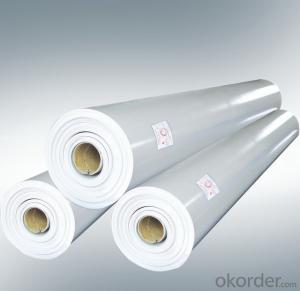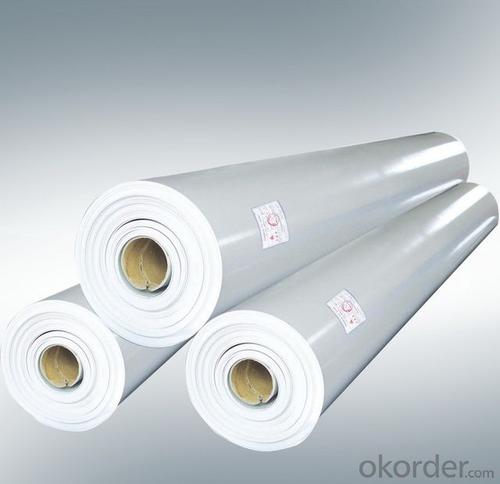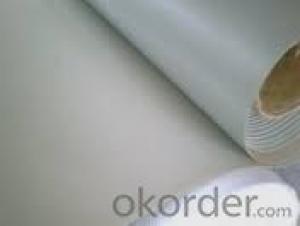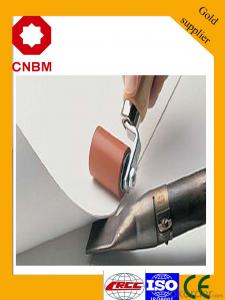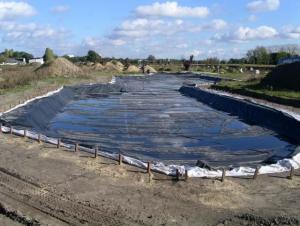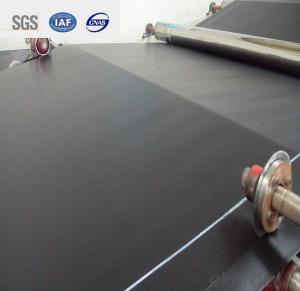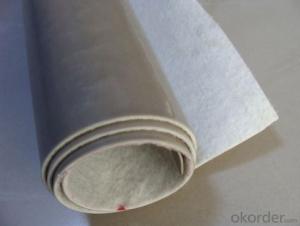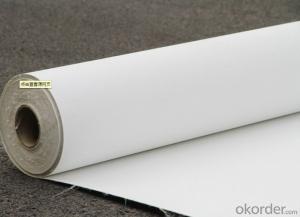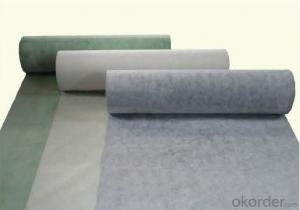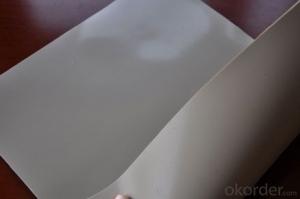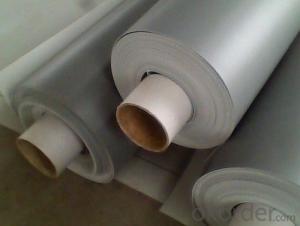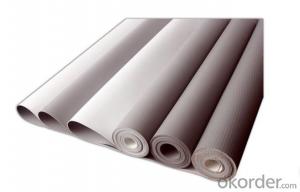Reinforced Polyvinyl Chloride PVC Waterproof Membrane
- Loading Port:
- China main port
- Payment Terms:
- TT OR LC
- Min Order Qty:
- 1000 m²
- Supply Capability:
- 50000 m²/month
OKorder Service Pledge
OKorder Financial Service
You Might Also Like
PVC roofing waterproof membrane with UV resistance
Item | Specification |
Length | 20m |
Width | 1.05m, 2.05m,2.1m |
Thickness | 0.8mm,1.0mm;1.2mm;1.5mm;2.0mm |
Advantages:
1. High tension, perfect elongation to resist the stretching or cracking of the foot layer.
2. Perfect jointing, It can be fused with base as a whole after heating the jointing by hot wind.
3. High permeability, chilling material and moisture can be expelled easily.
3. High aging resistance, UV resistance, corrosion resistance and erosion resistance.
4. Good cold flexibility and heat resistance
Scope of Application
1 Large-scale underground structures.
2 Surface of concrete slabs for planting.
3 For Roads, Rails, Subway tunnels projects.
4 For reservoirs, canals, dams and other water conservancy projects.
5 For air defense, military facilities waterproof projects.
Type:
N1—Exposed PVC waterproof membrane.
(It is mainly used as details treatment for exposed roof waterproof project)
N2—Non-exposed PVC waterproof membrane.
(It is mainly used as details treatment for non-exposed roof waterproof project)
L1—Exposed PVC waterproof membrane with fabric.
(It is mainly used for exposed roof waterproof project)
L2—Non-exposed PVC waterproof membrane with fabric.
(It is mainly used for non-exposed roof waterproof project)
FAQ of PVC Waterproofing Membrane
a.Can we get some samples before place order?
Answer: We can send the free samples to you by freight collect.
b.How many years can your PVC membrane guarantee?
Answer: We will guarantee the quality for 5 years at least.
c.Which countries you ever export the product?
Answer: We export the PVC membrane to South Africa, Middle east and even European countries.
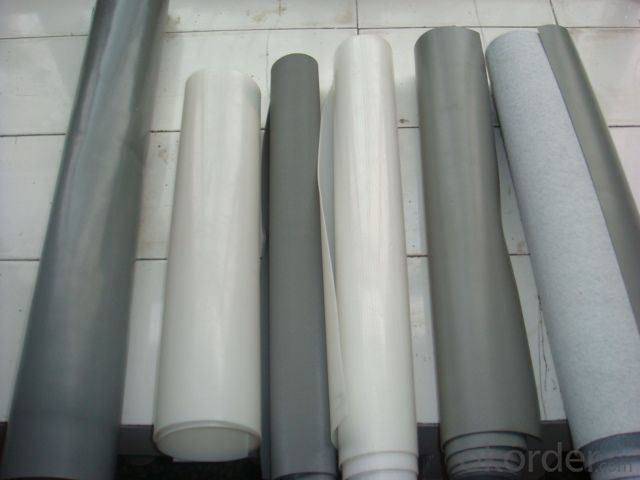
- Q: Are waterproofing membranes resistant to earthquake-induced water pressure?
- Waterproofing membranes can provide some level of resistance to earthquake-induced water pressure, but their effectiveness may vary depending on the specific membrane and the magnitude of the earthquake. Waterproofing membranes are designed to create a barrier against water infiltration, protecting the structure from water damage. However, they are not specifically designed to withstand the pressure caused by earthquakes. During an earthquake, the ground can experience significant shaking and movement, which can result in increased water pressure in the surrounding soil and groundwater. This increased pressure can potentially cause water to seep through the waterproofing membrane, compromising its effectiveness. To enhance the resistance of waterproofing membranes to earthquake-induced water pressure, additional measures may be required. These can include reinforcing the membrane with materials that can absorb shock and movement, installing drainage systems to alleviate excessive water pressure, and ensuring proper installation and maintenance of the membrane. It is important to consult with a professional waterproofing expert or structural engineer to determine the most suitable waterproofing system for earthquake-prone areas. They can provide guidance on selecting membranes that are specifically designed to withstand higher water pressure and offer better protection against earthquakes.
- Q: Can a waterproofing membrane be used for tunnels or subway systems?
- Yes, a waterproofing membrane can be used for tunnels or subway systems. Tunnels and subway systems are often subjected to water infiltration due to the surrounding soil conditions or groundwater levels. To prevent water from entering these underground structures, a waterproofing membrane is commonly applied. This membrane acts as a barrier, preventing water from seeping into the tunnels or subway systems. It is typically installed on the exterior surface of the tunnel walls and roof, creating a watertight seal. This helps to prevent corrosion, decay, and damage to the structural elements of the tunnels and ensures the safety and longevity of these underground infrastructures.
- Q: Can a waterproofing membrane be used in balconies or decks?
- Waterproofing membranes can be utilized in balconies or decks to prevent water penetration and safeguard underlying structures against moisture damage. Balconies and decks are frequently exposed to various weather conditions, including rain and snow, which can result in water damage and deterioration. By installing a waterproofing membrane, a barrier is established that hinders water from seeping into the underlying structure, ensuring its long-lasting and sturdy nature. Moreover, waterproofing membranes also provide protection against other forms of water damage, such as the growth of mold and mildew, which can compromise the integrity of the balcony or deck. In summary, the use of a waterproofing membrane is an efficient solution to maintain the functionality and prolong the lifespan of balconies or decks.
- Q: Can a waterproofing membrane be used in rooftop gardens or green roofs?
- Yes, a waterproofing membrane can be used in rooftop gardens or green roofs. It is an essential component to prevent water leakage and protect the underlying structure from moisture damage. The membrane acts as a barrier, preventing water from penetrating the roof and causing potential structural issues. This ensures that the rooftop garden or green roof remains well-maintained and functional.
- Q: Can a waterproofing membrane be used on foam block surfaces?
- Yes, a waterproofing membrane can be used on foam block surfaces. The membrane acts as a protective barrier, preventing water penetration and ensuring the foam blocks remain waterproof.
- Q: Can a waterproofing membrane be used in areas with heavy foot traffic or vehicle loadings?
- In high-traffic or heavy loading areas, it is possible to utilize a waterproofing membrane. Nevertheless, it is crucial to select a membrane specifically designed for such purposes in order to guarantee durability and longevity. These specialized membranes are typically thicker and more resistant to wear and tear. Furthermore, it is important to consider the type of traffic or loading that the area will endure. For instance, areas with vehicular traffic may necessitate a membrane with higher compressive strength to endure the weight of vehicles. In conclusion, the selection of the appropriate type of membrane that satisfies the specific demands of the application is of utmost importance when using waterproofing membranes in high-traffic or heavy loading areas.
- Q: Can a waterproofing membrane be used on concrete walls?
- Yes, a waterproofing membrane can be used on concrete walls. Waterproofing membranes are commonly used to protect concrete walls from water infiltration and can effectively prevent moisture from seeping through the concrete surface.
- Q: Can a waterproofing membrane be used for stadiums or arenas?
- Yes, a waterproofing membrane can be used for stadiums or arenas. Waterproofing membranes are commonly used in construction to prevent water infiltration, and they can be applied to the roofs, walls, or foundations of stadiums or arenas to protect them from water damage. These membranes are designed to withstand harsh weather conditions and provide long-lasting protection, making them suitable for large-scale structures like stadiums or arenas.
- Q: Can a waterproofing membrane be used in agricultural structures?
- Yes, a waterproofing membrane can be used in agricultural structures. Agricultural structures such as barns, greenhouses, and storage facilities often require protection from moisture and water damage. A waterproofing membrane is a durable and flexible material that can be applied to different surfaces such as roofs, walls, and floors to prevent water infiltration. It acts as a barrier, preventing water from seeping into the structure and causing damage to the building materials, equipment, and stored crops. Additionally, a waterproofing membrane can also help regulate the temperature and humidity levels within the agricultural structure, creating a more controlled and optimal environment for crops, livestock, and equipment. Overall, using a waterproofing membrane in agricultural structures can help ensure the longevity and functionality of the building while protecting the valuable assets inside.
- Q: Can a waterproofing membrane be installed on wood surfaces?
- Yes, a waterproofing membrane can be installed on wood surfaces.
Send your message to us
Reinforced Polyvinyl Chloride PVC Waterproof Membrane
- Loading Port:
- China main port
- Payment Terms:
- TT OR LC
- Min Order Qty:
- 1000 m²
- Supply Capability:
- 50000 m²/month
OKorder Service Pledge
OKorder Financial Service
Similar products
Hot products
Hot Searches
Related keywords
